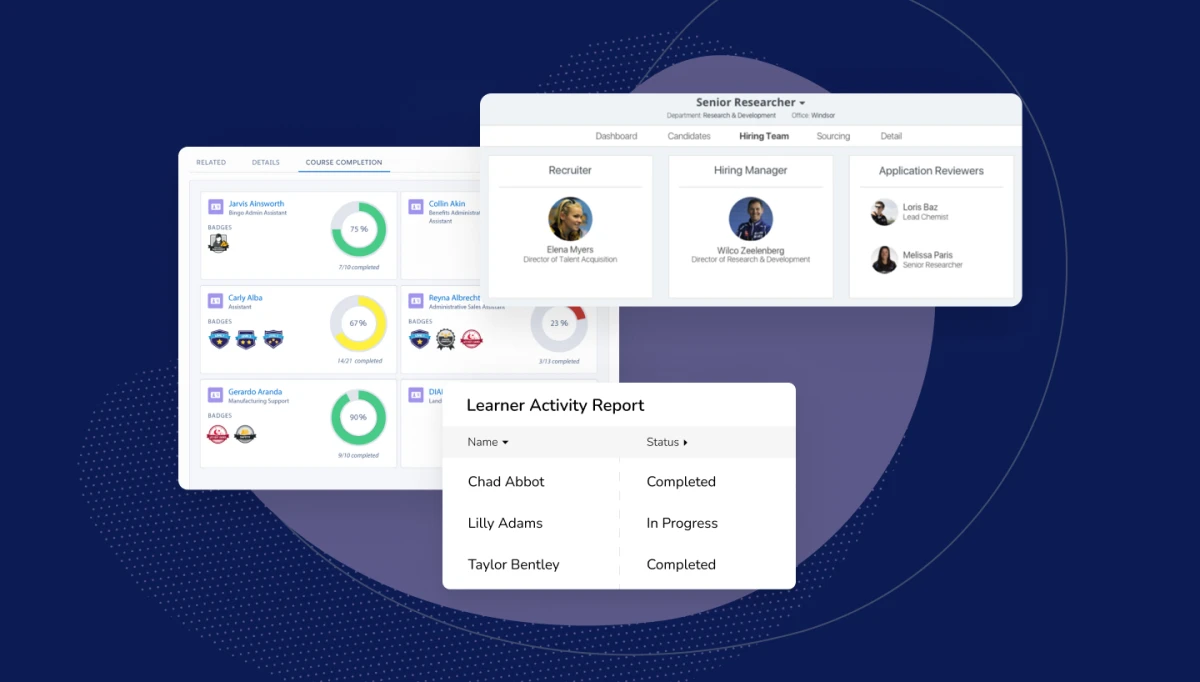A learning management system (LMS) makes it easy to consolidate your training and learning materials into one place. And while that's great and all, what happens if you need them in more than one place? Well, first let's recognize that there's a pretty big difference between consolidation and isolation. Just as no man is an island, no software should be either. Having software that can play well with others improves your business and integrating your LMS is no exception. Integrations make it easier than ever to elevate the benefits of a software suite while simultaneously cherry-picking the very best software to meet each business need. Training, whether blended or eLearning, can have a dramatic impact on your business. That makes connecting your LMS to other business software more beneficial than ever. Let's take a look at some specific LMS integrations that will improve your business.
1. Human Resources
There's a natural yin-yang relationship between your HR software and an LMS. Integrating the two will make your life easier, especially when it comes to creating and managing learner activity. Imagine a world where connecting employees with all the training materials they need for their role is as easy as updating your HR software. Well, my friend, you can stop imagining because you're living in it. Say goodbye to tracking people down to confirm they've gotten the latest compliance updates. Forget about remembering who needs which certifications renewed and when. Make it easy for everyone to access information about vacation pay, sick days and your benefits program. Integrating your LMS and HR software helps keep your human resources department running smoothly.
2. Website Integration & eCommerce
If you're an eLearning service provider, this is a big one. If there's one thing customers appreciate it's a streamlined user experience. Nothing gives a customer more confidence than seeing that they're purchasing from a tech-savvy, detail-oriented business that keeps things easy for them. The best part? While you're most certainly making things easier for your customers, you don't actually need to be all that tech-savvy or detail-oriented. Integrating your LMS and website is pretty simple.
3. Sales & Customer Service
Sales and customer service professionals know there's a lot of work that goes into closing deals and managing customer relationships. Internal training and support play an integral part in the process. Using an integrated LMS to link your training materials directly to your CRM (customer relationship management) software puts everything your sales and customer service teams need in one place.
4. Enhanced Reporting
Making data-based business decisions is more important than ever. Yet one of the biggest pitfalls of standalone software is data limitations. Without integrating your platform of record with key systems, you're simply not getting all the data you need to make sound decisions. Integrating your software with your LMS removes this roadblock. Connecting your training and learning data to your other software is a huge time saver. It minimizes the need to manually cross reference data, but it also empowers you to generate reports demonstrating the impact your training and learning program is having on different aspects of your business. While the out-of-the-box reporting options available through your LMS provide plenty of value, adding a more comprehensive reporting module will take you even deeper into your data. They can offer deeper, more customizable reporting LMS capabilities, and enable you to view dashboards and deliver actionable reports at your fingertips.
How Integration LMS Works
Now that you know some of the ways that integrating you LMS with other business software can improve your business, let's take a quick look at how. Not that long ago, the only way to have integrable software was to buy an entire suite of products. As we haven't been shy of saying, software suites are like the big-box stores of business software. Sure, they're convenient and cover a lot of ground, but they typically lack the attention to detail and artisanal quality that sets independent software apart. Luckily, things have changed. Software developers now commonly use APIs (Application Programming Interfaces) and webhooks to help standalone software play nice with others. APIs pull data into a software, whereas webhooks are used to push information out into others. They're a dynamic duo that works wonders when it comes to sharing data across your cherry-picked software solutions, improving performance across the board.
Integrating with Absorb LMS
Absorb LMS integrates with dozens of industry-leading business software solutions, making it easier than ever to connect your training and learning materials to improve all parts of your business. To learn more about Absorb LMS, contact our sales team. To see Absorb live right now, visit our website.





